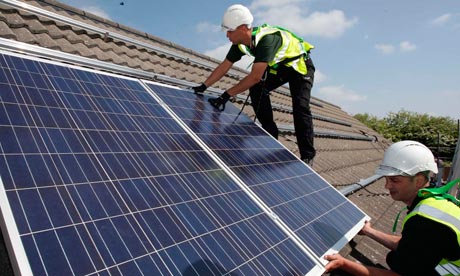
Earth Protect Blog
- Font size: Larger Smaller
- Hits: 7914
- 0 Comments
What Brings Solar Panels within a Common Man’s Reach?


Over the last few decades we have witnessed notable advancement in the technology for solar panels. When solar panels were first invented they had a conversion efficiency of less than 10 percent. The conversion efficiency is nothing but how well panels convert solar light into electricity. Today, we have commercially available panels which boast of an efficiency as high as 21 percent!
Does installing solar panel really make financial sense?
Based on historical trends, it is predicted that panel efficiency will improve by 200 basis points every seven years. While on the face of it the 200 basis point improvement may appear a little lackluster but on the current base of approximately 21 percent it implies a 10 percent growth in power output.
Even at the current level of conversion efficiency and upfront capital costs, the cost of producing a unit of electricity is almost at par with the other energy options. While the current installed base of solar panels is still very much in its infancy but as solar panels economics coming close to that of grid power we are on the verge of witnessing a major outbreak in panel demand. In some places where the cost of electricity is on the higher side, solar panels present a viable option even without the government assistance and incentives.
Technological improvements have significantly brought down the cost of installing solar panels
The improved economics of solar panel is not just because of improved conversion efficiency but a large part of this improved panel economics is also driven by lower capital costs of panel. Thanks to improved manufacturing efficiency and technology, there has been a notable reduction in capital cost of solar panels and ancillary equipment like rack and inverter. We are also witnessing a reduction in soft costs which include the interest cost and customer acquisition costs.
Cheap and easy finance
So that huge upfront cost of purchasing panels is not a deterrent for customers looking to go green, there is great degree of financial engineering that is also helping. Lease options help customers take benefit of solar energy without having to manage to pay the huge costs upfront. The lease payments are so structured that savings generated in the energy bill can be paid out in form of regular lease. These panels can be connected to the grid and when you are not using the electricity from the panel the grid can use. You will be billed only for the net energy you consume from the grid after deducting the energy units you supplied to the grid.
Installing solar panel on roof tops is no longer just a choice of the elite and Eco friendly people. It is rather a financially attractive proposition for those looking to save electricity costs and looking to get some independence from grid power supply. If you have just 350 square feet of roof top space, you can generate enough electricity using solar panel to meet the entire electricity demand of the house. With costs falling quickly and growing number of vendors who have the technical know-how to mount solar panels, we will sooner or later see almost every other roof top having its own power supply managed through solar panels.
Comments
-
Please login first in order for you to submit comments













